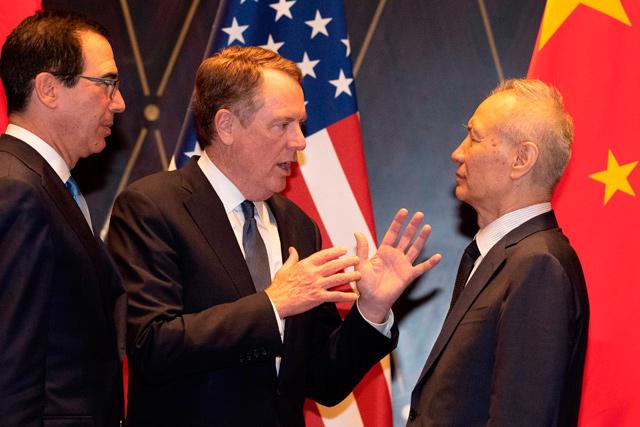You are here
Division, confusion in the Chinese street over how China should respond to trade war
By Reuters - Aug 13,2018 - Last updated at Aug 13,2018

Vendor Zhao Baoxin, 61, speaks during a street interview on the US China trade war at his shop in Beijing, China, on Tuesday (Reuters photo)
BEIJING/SHANGHAI — Chinese officials have been mostly measured and moderate in their response to US President Donald Trump's ratcheting up of a trade war with Beijing in recent weeks through his announcement of a series of punitive tariffs. They have generally avoided adding to tensions, allowing the Communist Party's official media to make the most bellicose comments.
But the mood on the streets of Beijing and Shanghai is a little less accepting. Reuters talked to a cross section of 50 people, mainly from the two cities; about how concerned they are about the trade war, what they think Beijing's response would be, and whether they think Chinese people should boycott American products in retaliation.
The interviews showed there is no palpable sense of crisis or panic yet. There is division and confusion over how China should respond to Trump, with some arguing that Beijing should strike back at American interests but others saying they did not know what could be done.
But perhaps most worrying for American businesses selling in China, a significant minority of the people interviewed — 14, or 28 per cent — want to stop buying American products now, and some say they are already boycotting anything made in the US Others said they would continue to buy American but that could change in the future.
If that was representative of the whole of China — and words were turned into action — it might start to put a dent in sales of Apple's iPhones, Disney's movies, Starbucks' drinks and General Motors' cars, among other American products — and that's without any boycott being organised by the government or activists.
A decade after China basked in the patriotic glory of an inspirational opening ceremony for the Beijing Olympics, nationalist sentiment is rarely far below the surface.
The straw poll's sample is very small and clearly not scientific. The interviews were also conducted in a country where people are often guarded and may well not let foreign media know their real views. Any individual's comments deemed inappropriate — criticism of Xi would fall into this category — could lead to trouble with the authorities.
But the views expressed in the 50 interviews are more than the basis for idle curiosity.
Here are the results of the straw poll:
Asked whether they were worried about the trade war, only 11 of the 50 (22 per cent) said they were, and 39 (or 78 per cent) said they weren't concerned.
Asked what Beijing should do in response to Trump's punitive tariffs, 19 (or 38 per cent) said that it should strike back hard. The rest came up with various responses, including a refocus on development of the domestic economy building other export markets, while 8 (or 16 per cent) said they had no idea what the government should do.
Asked whether they would stop buying US products, 14 said they would, 31 said they would not (some indicated their views could change if the trade war intensifies), and five did not have a view.
Here are some of the comments from those interviewed:
"Of course I'm concerned. It's a clash between the largest and second-largest economy," said Shanghai stockbroker Cai Qing, 40. "None of the relevant parties were fully prepared for the trade war. Policies were rushed, including US policies," he added.
"To put it bluntly, Americans have always been so arrogant — they make everyone their manufacturer so they can reap the economic fruit," said Qu Xinjun, who works in the steel industry in Shanghai. "Trump is waging a psychological war with China. He was trying to intimidate China. From a psychological standpoint, we should not worry about the trade war, but rather focus on domestic development," he said. "We should trust our country and the leadership and trust that we can win the war."
"China has to hit back, which could show its great power status. China has to win this match," said Beijing interior decorator Zhang Shiyou, 56.
China has other markets it can look to, and President Xi Jinping's landmark proposal to build a new Silk Road, called the Belt and Road initiative, he said.
"We Chinese should not buy Apple phones. Like the saying 'Buy the nation's products, love China', buying domestic products will boost our own industries."
"A lot of American goods are actually made in China," said Wei Shaochuan, 26, the founder of a tech start-up in China's central Henan province, that was interviewed on WeChat.
"But if, after a period of time, the trade war really incites a sense of hatred against the United States, then I will not watch American movies, not listen to American music, not recommend Disney to friends, and start writing social media posts saying that Americans are not good, in order to counter American cultural products," he said.
"I'm a strong supporter of Chinese products. I'm a firm opponent of any American product, especially after reading the news," said Zhao Guoxin, 61, a store owner in Beijing. "The other day I went to this American shop and I told them I won't buy one single thing, and I made them very awkward…," he said.
"To be honest, importing from the US isn't our sole route," said Wang Yangqing, a Beijing nurse who said she was in her 20s. "We could also import from European countries. For girls, we use some American skin care products. If tariffs keep rising, I may shift to products from other places such as Japan or Korea."
"China should strike back properly," said Xu Dong, 25, a student in Beijing. "But I won't stop buying their products. Some enterprises like Apple in fact bring in tax revenues and employment. It's a brand that is doing good to China," he said,
"For me, it [the trade war] is great!" said Zhu Tao, 34, a ship catering manager in Beijing. "That's because I receive my salary in US dollars and since the US-China trade war started the US dollar has kept increasing in value compared to the yuan. So I think it has really helped me. It's great!"
Related Articles
SHANGHAI — US and Chinese negotiators agreed to meet again in the United States in September after holding "frank" and "constructive" talks
SHANGHAI — The Chinese yuan fell to its lowest level against the dollar since August 2010 in morning trade on Monday, fuelling speculation t
SHANGHAI — Spain's Prime Minister Pedro Sanchez said on Wednesday the European Union should "reconsider" a plan to impose tariffs of up to 3


















